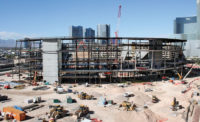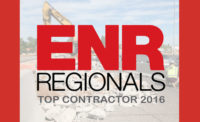Las Vegas Paving Risk Manager Esposito Talks Surety, Insurance
Las Vegas Paving Corp., a 54-year-old, privately owned heavy-highway contractor based in Las Vegas, is regularly ranked among the top two general contractors on ENR Southwest’s annual Top Contractors ranking, and was the 2nd ranked transportation contractor in the three-state Southwest region in 2011. Las Vegas Paving’s largest project start of the past year was the $116.8-million Route 215 Bruce Woodbury Beltway, Tenaya Way to Decatur Blvd. project, which expands an existing interim roadway to four lanes and adds full interchanges and overpasses.


ENR contributor Tony Illia recently talked to Lou Esposito, the company's risk manager, about how he got started in risk management, what difference the recession has made in his approach and where insurance is heading.
What is your background, and how did you begin working as a risk manager?
Lou Esposito I began my career in 1980 as an adjuster trainee with Republic Claim Services. I handled small claims for The U Haul Corp. After I finished my training, I went onto obtain my associate's [degree] in claims and my associate's in risk management. I worked as a fraud investigator, but my training led to my current position, in 2002.
Has the recession caused any major change in the way you buy coverage, insure risks or obtain surety credit?
The recession has made us think in terms of "shopping" for the best quotes and giving consideration to [larger deductibles for] those that can afford to do so. For some companies, exploring self-insurance and captive market is also an alternative.
Why is the relationship with an individual insurance or surety-bond broker so important? Does it keep down costs? After all, if you switched your broker and then had to get a new bond or insurance-policy underwriter, rates could go up 20% or more.
I believe long-term relationships work best [and provide] the most options for obtaining rates. This cannot be accomplished by constantly changing insurance brokers and/or insurance companies.
Lately, more people are thinking holistically about risk control, including safety, all insured risks, surety, regulatory compliance and ethics. Is it better to consolidate or keep separate these elements?
Many companies put their risk all together. That is not always a bad thing. Some companies, meanwhile, have successfully separated it—[which] is something we are testing right now. Safety is its own department, as is risk management. Of course, these two entities must still work with each other in order to be successful.
We hear that workers' compensation has to go up in 2012, that competition will keep all other coverage premiums the same and that new underwriting approaches and new sureties will make bonds a little cheaper and more available.
Workers' compensation rates are definitely on the rise, but I am doubtful whether this will keep all other coverage premiums the same. The market currently has hardened somewhat. I suspect that trend will continue as re-insurance becomes an issue with the past and recent natural disasters.
What is the most important risk people don’t think about, tend to overlook or underinsure?
I find that most risk people I know don’t overlook any potential risk. The construction industry, however, overlooks contractors’ liability at times. Some companies think this only applies to design-build projects; they fail to understand that it goes beyond just design-build-type contracts.



